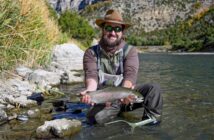London, England—Six prestigious UK jewelry retailers and designers representing 260 stores today pledged their support for Bristol Bay, Alaska, by announcing that they will not buy gold from Anglo American’s proposed “Pebble” mine, a massive open-pit operation being considered in the bay’s headwaters. The Bristol Bay watershed supports the world’s most productive wild sockeye salmon fishery, which is critical to the state’s economy and to the livelihoods of many Alaska Native communities. The UK is the largest consumer of Bristol Bay canned sockeye salmon.
UK jewelers Goldsmiths, Beaverbrooks, Mappin & Webb, Watches of Switzerland, Fifi Bijoux and April Doubleday took this step at the invitation of local Alaskans who seek to protect wild salmon, clean water and their traditional ways of life from the damaging effects of industrial metal mines.
“We at Beaverbrooks support the protection of Alaska’s Bristol Bay watershed from large scale mining,” said Mark Adelstone, managing director of Beaverbrooks the Jewellers. “We need to be mindful and respectful of the Bristol Bay salmon fishery and the communities that depend on it. We feel that the precious metals that we sell need to be mined responsibly and in environmentally friendly ways and if this means looking to other places to source gold, then so be it.”
In pledging not to source gold mined at Pebble, the UK jewelers join eight U.S. retailers who endorsed the pledge last year, including Tiffany & Co. (which has seven stores in the UK), Helzberg Diamonds, and Ben Bridge Jeweler. The threat to the Bristol Bay fishery has generated an unusual and diverse array of allies, including Alaska’s commercial fishing industry, over 140 sportfishing businesses, the Alaska Intertribal Council (a consortium of 231 Alaska Tribes), and numerous conservation groups.
“The support demonstrated by these respected UK jewelers is greatly appreciated and will help us to protect the wild salmon fishery that has sustained our economy and people for generations,” said Thomas Tilden, board member of the Choggiung Native Corporation.
The proposed Pebble gold-copper mine is a project of UK-based Anglo American, one of the world’s largest mining companies, and Northern Dynasty Minerals of Canada. The mine is projected to generate an estimated 9 billion tons of waste, much of it containing acids and toxic metals to be stored on site in what is now pristine Alaska wilderness.
“Sustainable development is surely a necessary value which is core to any 21st century business,” said Vivien Johnston of Fifi Bijoux. “I am surprised that Anglo American would pursue a programme in Bristol Bay which is clearly not in the best interests of the long term sustainability of the local community or the conservation of important ecosystems. I would ask them to revise their strategy and review their CSR standards to ensure that any new mining site need not compromise their vision of environmental integrity and community consultation.”
Alaska Native communities’ way of life, and Alaska’s largest private sector employer – the fishing industry – are heavily dependent on the continued health of Bristol Bay. Bristol Bay’s commercial fishery generates $320 million a year and 12,500 jobs. Bristol Bay residents harvest and consume an average of 315 pounds (143 kilograms) of fish per person per year, making the salmon a primary source of food. Unlike many of the world’s wild salmon populations, which are in serious decline, the pristine rivers and undeveloped landscape of the Bristol Bay watershed continue to support a sustainable world-class salmon fishery that supplies healthy seafood to consumers around the world. A third of the world’s commercial sockeye salmon are harvested there, according to the Alaska Department of Fish and Game.
These UK and U.S. retailers who have signed on to the Bristol Bay protection pledge have also endorsed the “Golden Rules” of the No Dirty Gold consumer campaign spearheaded by EARTHWORKS, which has called on mining companies to meet environmental and social standards. So far, some 55 retailers worldwide have endorsed the Golden Rules. A complete list can be found on the No Dirty Gold website. More than 100,000 consumers in over 100 countries have also signed the No Dirty Gold pledge, urging mining companies to provide alternatives to “dirty” gold.
“The Pebble mine would imperil one of the world’s most pristine and productive ecosystems,” said Bonnie Gestring of international mining reform group EARTHWORKS. “We applaud the jewelry retailers for signing on to the Bristol Bay protection pledge, and demonstrating their commitment to responsible sourcing.”
For fact sheets and more information on Bristol Bay, Alaska, proposed Pebble Mine, visual images updated daily from London and more, visit www.ak2uk.com. For photos, fact sheets and information about the No Dirty Gold campaign, visit www.nodirtygold.org
For more information:
Harlin Savage, Resource Media in London, (208) 133-8769 (US), 07529 737053 (UK)
Lynda Giguere, Resource Media, Anchorage, (907) 723-6910, lynda@resource-media.org
Bonnie Gestring, EARTHWORKS, (406) 546-8386 (US), 07552 536171 (UK)
Mark Adelstone, Beaverbrooks the Jewellers, 01253 721262 ext 5003 (UK)



